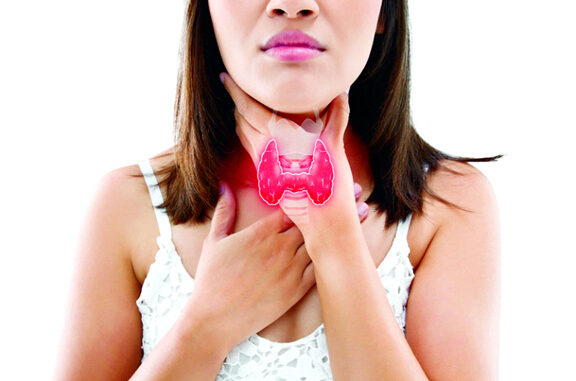
The thyroid gland, located in the front of the neck, is the main source of thyroid hormones in the body and hypothalamic thyrotropin-releasing hormone (TRH) stimulates thyroid-stimulating hormone (TSH) synthesis from pituitary gland of our body. TSH stimulates thyroid hormone (T3,T4) synthesis with the help of thyroid peroxidase (TPO) enzyme from thyroglobulin protein and iodine within the gland.
Very minute amount of total thyroid hormones is not bound to any proteins in the circulation and known as free thyroid hormones, which are responsible for the biological activities within the body. For the uninitiated, thyroid hormones maintains key functions such as metabolism rate in body, heart functions, digestive functions, muscle health, brain development, bone health etc.
Disorders due to imbalance in thyroid hormones
Dr Soumi Ghosh, Consultant Biochemist at Neuberg Anand Reference Laboratory, highlighted two types of thyroid disorders and their symptoms as:
Hypothyroidism
It is associated with decreased free and total thyroid hormones and increased or decreased TSH according to the causative factors. Subclinical hypothyroidism is a condition where persistent elevation in TSH (6 to 12 weeks or longer) is seen but FT4concentrations is found within the normal range.
Among the varieties of hypothyroidism, congenital hypothyroidism (presence since birth) is the most important, as it requires an early diagnosis and treatment to prevent brain damage. Maternal hypothyroidism is a risk factor for developing this disease. Other causes of hypothyroidism are antibodies developed in a person against his or her own thyroid gland, bacterial or viral inflammation in the thyroid glands leading to its damage, radiation or surgery in the thyroid glands. Apart from that certain foods (for example cabbage, cauliflower, soy products, peaches, peanuts) and certain drugs can interfere with thyroid hormone synthesis and cause hypothyroidism.
Risk factors for hypothyroidism include advancing age, type 1 diabetes, family history of thyroid disease, goitre, previous hyperthyroidism, external-beam radiation in the head and neck area, baby born with Down syndrome and females are more prone to develop thyroid disease.
Hyperthyroidism
This results from increased free and total thyroid hormones and decreased hormonal or increased TSH in the body as per the causative factors. The causes are autoimmune thyroid disease like Graves’ disease, viral or bacterial infections of thyroid gland lead to release of more thyroid hormones, overproduction of thyroid hormones due to certain unknown causes and over consumption of Iodine etc. Risk factors for hyperthyroidism include advancing age, personal or family history of thyroid diseases, and intake of iodine-containing drugs, like amiodarone, and females are more prone to develop thyroid disease. Symptoms include nervousness, emotional liability, restlessness, sleeplessness, difficulty in concentrating, smooth and/or shiny hair and skin, weight loss, excessive sweating, heat intolerance, menstrual irregularities, diarrhoea etc. Physical signs are increased heart rate, irregular heartbeats, increased blood pressure, warm and damp skin, tremor, signs of ophthalmopathy (changes in the eye). Euthyroid hyperthyroxinemia is a condition where total T4 is increased but TSH, free thyroid hormones and total T3 are normal. This is usually seen in nonthyroidal illness and abnormalities in thyroid hormone binding proteins. Source: HT





Be the first to comment